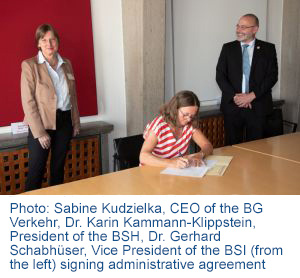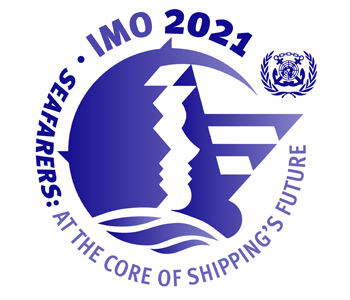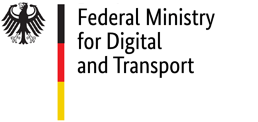News 2021
In a medical emergency the first minutes are decisive – immediate response can save lives! To close the gap between care at the place of emergency and the on-board hospital the Maritime Medical Service has developed emergency cards with first aid measures. The guidance stands in direct relation to the contents of the emergency bag.

On board the senior navigational officer is responsible for medical care. That is why in the summer of 2020, a student of the "Hochschule für angewandte Wissenschaften" (university of applied sciences) conducted an online survey among this occupational group. Her goal was to find out what expectations the future users might have of such cards. 125 persons participated; their suggestions were integrated in the development of the cards. For example: two languages! Hence why the front of the emergency card is in German and the back states the same in English.
The emergency cards can save lives and are now part of the mandatory medical equipment on board sea-going vessels flying the German Flag in accordance with the Maritime Labour Act. They are available for 19.90 Euro at Akamedica-Shop.
Since this year, IMO has made it mandatory for shipping companies to protect against cyber risks. The BG Verkehr, the BSH and the Federal Office for Information Security (BSI) support shipping enterprises with circulars and recommendations. Now, these three authorities have established in an administrative agreement to intensify their cooperation.
 The issue cyber security becomes increasingly important for maritime shipping as significant part of the global logistics chain. Just one of the latest attacks was with the malware "NotPetya" in 2017 where the shipping company Maersk alone suffered damages of several hundred million Euros, which made clear how immense the magnitude of cyber-attacks can be in maritime shipping.
The issue cyber security becomes increasingly important for maritime shipping as significant part of the global logistics chain. Just one of the latest attacks was with the malware "NotPetya" in 2017 where the shipping company Maersk alone suffered damages of several hundred million Euros, which made clear how immense the magnitude of cyber-attacks can be in maritime shipping.
Sea-going ships fall victim to cyber-attacks more and more often because they are floating data processing centres. And these data processing centres can get attacked. Which means that for example navigational systems used on board ships do not just make them susceptible to disturbances but also connect them to the internet and thus create doorways for computer hackers.
Cyber hazards also lurk in ports. Admission systems, cargo handling, steering systems for cranes and the SCADA software often used in industrial steering systems turn ports into highly connected IT systems. The more steering and navigational systems at land and sea become interconnected with other networks und entertainment systems, the easier it becomes for third parties to gain access via IT interfaces along this chain of systems.
Since this year, IMO has made it mandatory for shipping companies to protect against cyber risks. Ship operators have to integrate the relevant measures into their existing ISM systems. The BG Verkehr, the BSH and the BSI aid German shipping companies in this task. In the joint ISM Circular on "ISM Cyber Security", these three authorities offer practical tips on the topic cyber security. Sabine Kudzielka, CEO of the BG Verkehr, emphasizes: "The experts of our Ship Safety Division are happy to support shipping companies to establish an individual cyber risk management in their enterprise. Our experts used to serve at sea themselves and know what is relevant on board."
The Federal Maritime and Hydrographic Agency (BSH) points out its competences regarding cyber security: "The BSH is responsible for the verification of security systems on board ships flying the German flag. Furthermore, we work together with partners in scientific research on our technology development platform in the BSH system laboratory to find solutions that can prevent unauthorized access to ship systems", explains the president of the BSH, Dr. Karin Kammann-Klippstein.
The BG Verkehr, the BSH and the BSI have agreed upon an intensification of their cooperation regarding maritime cyber security. Based on an administrative agreement, they want to sensitize shipping companies for the topic "information security", provide support and carry out joint projects. "We want to share knowledge of and experiences with information security with shipping companies and German maritime enterprises and be a part in shaping the digital change in the shipping industry successfully," Dr. Gerhard Schabhüser, vice president of the BSI, gladly announces. "This administrative agreement in an important step towards this goal."
In addition, the BG Verkehr and the BSH will become a member of the alliance for cyber security and keep the BSI informed about IT security incidents in maritime shipping to create a more accurate overview of the situation. Moreover, joint publications such as guidance and checklists will get developed.
Seafarers are at the centre of this year's World Maritime Day of the International Maritime Organization IMO on 30 September 2021 with the topic "SEAFARERS: At the core of shipping's future". (15.9.2021)
 During the pandemic, the fate of seafarers has become a core issue in the maritime sector: keeping up the supply chain, the crew change crisis, the status of seafarers as key workers and a vaccination programme for seafarers. To acknowledge their dedication and highlight their importance, not only during the pandemic, IMO's World Maritime Day 2021 revolves around seafarers.
During the pandemic, the fate of seafarers has become a core issue in the maritime sector: keeping up the supply chain, the crew change crisis, the status of seafarers as key workers and a vaccination programme for seafarers. To acknowledge their dedication and highlight their importance, not only during the pandemic, IMO's World Maritime Day 2021 revolves around seafarers.
The human element plays a crucial role in maritime technological and environmental protection development. The human element is a challenge and at the same time an opportunity to successfully implement digitalization and automation by ensuring an appropriately trained and qualified future workforce, emphasizes Kitack Lim, IMO Secretary General. That's why IMO ties the topic "Seafarers: At the core of shipping's future" to United Nations' Sustainable Development Goals (SDGs), in particular:
- SDG 4: inclusive and equitable quality education
- SDG 5: gender equality
- SDG 8: decent work and economic growth
- SDG 9: industry, innovation and infrastructure
The focus of the World Maritime Day 2021 on seafarers is also reflected in different campaigns. On the IMO website, seafarers of various nationalities and ranks on board contribute to current maritime issues. In interviews, videos and panel contributions at the main event we find out how seafarers view their current situation and how they envision shipping's future. One thing becomes clear: Much has changed and is changing in the maritime sector in terms of diversity, environmental protection and digitalization. Seafarers are preparing for the upcoming changes and want to be part of the solution. But why don't you listen, read and watch yourself what Helen Frances Coultas, Ashwin Pillai, Veronica Bonimy and many more have to say.
From now on, the Federal maritime and Hydrographic Agency (BSH) offers a new online overview of the bunker suppliers. This new application makes the search for bunker suppliers easier and more convenient.
Shipping companies can now look up local fuel suppliers (fuel for ships) on the BSH website filtered by location, type of fuel and delivery amount. At https://www.bsh.de/EN/TOPICS/Shipping/Environment_and_shipping/MARPOL/marpol_node.html more than 30 suppliers are listed by now. More will follow over the course of 2021.
The BSH keeps this index of local fuel suppliers in accordance with the International Convention for the Prevention of Pollution from Ships (MARPOL Regulation VI/18.9.1). If you find any suppliers missing in the index and for further inquiries, please contact
Bundesamt für Seeschifffahrt und Hydrographie
Bernhard-Nocht-Straße 78
20359 Hamburg
E-Mail: marpol@bsh.de
In its Annual Report 2020 on the German Maritime Labour Act, the Ship Safety Division of BG Verkehr comprehensively presents how it verified compliance with the requirements of the German Maritime Labour Act throughout the last year. A guidance document on the topic "Working and living on board" aids with the implementation of the German Maritime Labour Act.
Since 2013 the Maritime Labour Act implements the International Maritime Labour Convention (MLC) on ships under German flag. With these provisions, mandatory and comprehensive regulations regarding working and living conditions of seafarers have been established. Important topics like hours of work and rest, food and catering, payment of wages, occupational health on board and many more are now clearly regulated and are verified on a regular basis.
36 MLC surveyors inspect international ships abroad and nationally regarding their compliance with the requirements of the Convention for the Ship Safety Division of BG Verkehr. Maritime Labour Certificates and Fishing Labour Certificates are typically issued as electronic certificates by now.
The employees of the ISM / ILO Department attend to complaints of seafarers about working and living conditions, approve private recruitment agencies and ensure that shipping companies under German flag are informed about current topics of this topic area. The ISM / ILO Department has now published its Annual Report 2020.
With its MLC Guidelines, the ISM / ILO Department offers support with the implementation of the Maritime Labour Act on board German-flagged ships. These MLC Guidelines are available for download directly to your smartphone so that you have them at the ready whenever you need them:

Validity of MED certificates after the Brexit
The United Kingdom left the European Union on the 31st of January 2020 and is now a third country. At first, because of an agreed transitional period, there were no legal changes for products that have to comply with the EU Marine Equipment Directive until the 31st of December 2020.
However, as of 1st of January 2021, conformity assessment procedures in accordance with MED can no longer be carried out by UK notified bodies. Accordingly, certificates for MED marine equipment may no longer be issued by them as of 1st of January 2021.
In addition, certificates issued by UK notified bodies can no longer be used by the manufacturer of MED marine equipment in the context of the MED conformity assessment as of 1st of January 2021. A further affixing of the wheelmark on MED marine equipment is no longer possible on the basis of these certificates since 1 January 2021!
Read more on the following topics:
- MED marine equipment
- marine equipment in the United Kingdom
- exit agreements between the EU and the United Kingdom
New safety requirements for sea-going vessels on sea trials
The new Safety requirements for sea-going vessels on sea-trials define the necessary general requirements for the special circumstances at a sea trial. As sea trials take place during a limited time and in a defined area, adapted safety requirements apply for example in regard to manning, watches, safety instructions of the persons on board and safety equipment in comparison to the normal operations later on.
Before it is put into service, a newly built, converted or repaired ship is tested comprehensively or regarding the converted or repaired elements at a sea trial. In order for the shipyard or shipping company, respectively, to be able to conduct a sea trial, the Ship Safety Division of BG Verkehr has to verify compliance with the safety requirements and confirm this with a Certificate of Sea Trial.
FAQ: German Flag about the coronavirus
We, as German Flag bear a responsibility to contain the Corona pandemic. For this, we adapt our procedures for ship certificates and ship surveys to the current situation. For seafarers facilitating measures are in place regarding certificates of competency and proficiency as well as medical fitness certificates. The most important information about this are given in an official statement by the German Flag.
In our FAQ "Corona Info", we answer all important questions about the implications of COVID-19 for seafarers and shipping companies. If you have any further questions, please mail via Feedback.
On its 75th session on 20 November 2020, IMO's Maritime Environment Protection Committee MEPC adopted several measures to further reduce the world's merchant fleet's fuel consumption and thereby its CO2 emissions. For the first time, these provisions include existing ships as well.
With two measures MEPC wants to make sea-going ships more efficient, and therefore more environmentally friendly:
- All ships of 5000 GT and more have to meet certain efficiency standards with the new EEXI (Energy Efficiency Existing Ship Index). In order to achieve this, ship operators have to implement technical means to significantly lower their fuel consumption and thereby the CO2 emissions of their ships. Already since 2013, a similar requirement, the EEDI (Energy Efficiency Design Index), has been in place for existing ships. The EEXI engages nearly the complete trading global merchant fleet to reduce their current CO2 emissions by up to 50 % depending on the ship type from 2023.
- Moreover, the IMO requires that from 2023 the ship operations are aligned with stricter CO2 emission levels. Every ship receives an assessment of its CO2 intensity, which is divided into five categories from A to E. This categorization is done with the CII (Carbon Intensity Indicator). A similar assessment is already known from electronic devices and cars. Based on the Carbon Intensity Indicator CII, shipping companies whose ships are assessed as class D or E in three in consecutive years have to develop a list of measures to reduce CO2 sufficient to return to class C. This instrument is also meant to increase pressure on ship operators to deploy only their most efficient ships on the market. In addition, the CII creates transparency for all market participants and a comparable data pool.
Currently, international working groups develop guidelines for the implementation of these measures to ensure the starting date 1st January 2023. Furthermore, the IMO panels plan further measures to reduce emissions from shipping such as alternative fuels, emission trade, as well as a CO2-free maritime transport of goods in the long run. The MEPC has not made any concrete decisions to this regard, however.
German Flag reacts to current Corona situation
he German Flag State Administration supports seafarers and shipping companies in their Corona pandemic management and has adapted their procedures to the current situation. For example, Certificates of Competency and Certificates of Proficiency are generally extended for 6 months. Ship surveys are currently only conducted in exceptional cases.
As in March, during the Corona lockdown German Certificates of Competency and Certificates of Proficiency that would expire are all valid for 6 more months. Seafarers do not need to apply individually for an extension of validity. If mandatory refresher courses are cancelled due to the Corona Virus but all conditions for an extension of validity are met, certificates will be extended regularly for 5 years. The proof of participation in the refresher course must be submitted at a later date. The BSH kindly asks to apply for this accordingly.
Medical fitness examinations can be performed with most of the physicians recognized by the BG Verkehr (compare https://www.deutsche-flagge.de/en/maritime-medicine/fitness-for-sea-service/authorized-physicians). If a medical certificate expires during a sea voyage and a renewal is not possible in the following port due to the corona restrictions in the ports (no crew change or visit at a qualified doctor is possible), the certificate remains valid until the next port in which a medical fitness examination can be performed – at the most for a further three months. The legal basis for this is the German Maritime Labour Act, Sec. 12 Para. 6, and the Maritime Labour Convention (MLC), Standard A1.2 Para. 9.
Medical Refresher Courses take place – exceptions excluded. If there are any problems in this area, please contact the Maritime Medical Service of BG Verkehr (seeaerztlicher-dienst@bg-verkehr.de).
Currently, the BG Verkehr conducts ship surveys only in exceptional circumstances. In regard to flag state surveys, shipping companies should contact the BG Verkehr to find individual solutions as to how and if upcoming surveys can be conducted. If a survey is not possible in a port due to COVID-19 safeguard measures, the German Flag can waive the survey on a case-by-case basis and after assessment of the following documents:
- Declaration of the shipowner explaining what circumstances / special conditions arising from COVID-19 restrictions make it impossible to conduct a survey
- Declaration/recommendation of the classification society responsible for the ship, including consultation of the latest class status records
- Evaluation of existing conditions of the classification society responsible for the ship (class conditions)
- Access to the report of the last inspection of the ship’s bottom, indicating IW (In-Water) or Dry-Docking
- Evaluation of the results from the databases of the respective port State control regime (PSC MoUs)
- Evaluation of the latest ISM audit report
- For non-convention ships (which are not subject to international conventions, such as SOLAS and others) and fishing vessels with a length of more than 24 metres: evaluation of the latest flag state reports
In these exceptional circumstances, the German flag can issue electronic short-term certificates that are valid until the date on which a survey of the ship is possible. Even in these exceptional circumstances, shipping companies must comply with all technical and operational provisions on their ships.
Currently, Port State Control in German ports only takes place due to overriding factors (please find the explanation on the website of Paris MoU ).
The German Flag has compiled its most important measures in an official statement which is available in the FAQ section regarding corona on our website: https://www.deutsche-flagge.de/en/coronavirus.

